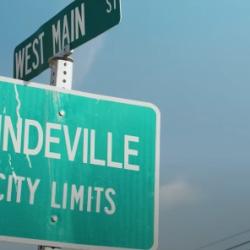On the one hand, you've got your religious evangelicals. They're born-again Christians who go to church twice every Sunday, read their daily devotions, try not to say "geez" because that's almost just as bad as swearing, feel guilty that they haven't done more to witness to you because they genuinely don't want you to go to Hell, and they just really Lord they just really just pray, Lord, all the time that, Lord, Jesus would just really just guide their daily lives.
We're talking about Ned Flanders. Nice folks. I like them a lot. I mean, I wouldn't want them designing the science curriculum for my kids' school, and I almost never vote for the same people they vote for, but those things aren't these folks' main focus. They're mainly about serving Jesus as their personal Lord and savior and trying to get others to do the same.
On the other hand, you've got your political evangelicals. On paper, these people look very similar to the Ned Flanders types. The difference is what they regard as paramount, as most important. For your political evangelicals, who you vote for and what is taught in science class is all that really matters. They may go to the same church as Ned, and they may attend just as often, but when push comes to shove that religious stuff isn't nearly as important to them as the pride and power of politics.
For a quick and easy illustration of the difference between these two groups, ask either one about immigration policy.
For religious evangelicals, immigration is looked at through the lens of two centuries of the missionary movement. Immigration, they believe, brings the mission field home. The categories of documented and undocumented are irrelevant in this view. The only categories that matter are saved and unsaved. Unsaved immigrants are a field white unto harvest. And saved immigrants are brothers and sisters in Christ. The former should be considered the focus of evangelism, the latter of fellowship.
Hence the existence, dating back to the 19th century, of evangelical "home mission societies" which have long helped to settle refugees and newly arrived immigrants, helping them find housing and learn the language and customs of their new home. And the existence, also, of ethnic immigrant congregations — often called "missionary" churches — sharing facilities with established English-speaking congregations.
This piece in today's Chicago Tribune nicely captures the attitude toward immigration that arises from a primarily religious evangelicalism.
The discussion within Wheaton Chinese Alliance Church reflects a shift among the nation's evangelical community as more pastors push for comprehensive immigration reform. In recent years, many influential evangelical leaders have moved from silent opposition to outspoken support for immigration reform, citing biblical foundations and Christian duty to care for strangers.
Last month, the National Association of Evangelicals, which represents about 45,000 U.S. churches, called on the Obama administration to establish a process by which undocumented immigrants could earn legal status. NAE President Leith Anderson said the group recognized the surging number of immigrants, mainly Latino and Asian, filling evangelical churches. …
Matthew Soerens, immigration counselor at World Relief DuPage and co-author of the book Welcoming the Stranger: Justice, Compassion and Truth in the Immigration Debate, said the stronger support for reform is due to the realization that immigrants are changing the face of the American evangelical church.
"We see this as a biblical issue grounded in the Scriptures, and primary to what we believe," Soerens said. "But what is also true is the demographics of our country is changing with immigration, and evangelical leaders realize that the fastest growth they are experiencing is among immigrant congregations."
Two of the largest evangelical churches in the area, Willow Creek Community Church in South Barrington and Wheaton Bible Church in West Chicago, now have Spanish-speaking congregations and support immigration reform. …
That's interesting. Here in America, "evangelical Christian" almost unfailingly also means "Republican," and the Republican Party is adamantly opposed to the sort of liberalized immigration reform being endorsed by these religious evangelicals.
That conflict hasn't gone unnoticed by the political evangelicals. Professional douchebag Mark Tooley — whose job as president of the Institute on Religion and Democracy is to politicize American Christianity for the benefit of the right-wing foundations that fund IRD — denounced the religious evangelicals at the NAE and elsewhere for failing to adhere to a strict Lou-Dobbs, xenophobic, Tea Party chauvinist, barbarians-at-the-gate party line scapegoating of immigrants.
"Several NAE members have denied endorsing the immigration resolution. Did the stance actually emerge from NAE's constituency? Or was it simply 'handed down from on-high' by NAE elites?
"This controversy is not only about immigration policy … It is also about NAE's increasing politicization and elitism, a dangerous trajectory veering towards irrelevancy and pioneered by the National Council of Churches."
The NAE's position on immigration arises directly and organically from its religious perspective. Tooley's position on immigration arises directly and inevitably from his partisan politics. How they each respond is a function of what each regards as most important — what drives them and shapes their identity.
For the Ned-Flanders types, that essential identity has to do with their Christian piety. That's why religious evangelicals are such nice people and why they make excellent next-door neighbors.
For the Mark-Tooley types, that essential identity has to do with their anything-to-win grasping after partisan power. That's why political evangelicals are such despicable assholes.
















